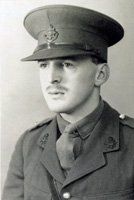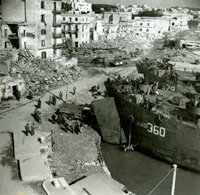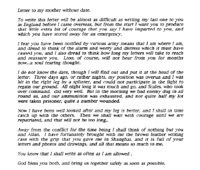
Major Mornement was born in 1914 and was commissioned into the 2nd Battalion of the East Surrey Regiment in 1936. He then transferred to the 1st Battalion in 1937 and served in India, Sudan and Shanghai before coming back to England in 1940. He transferred to the 1/6th Battalion, a Territorial unit, in 1941 and served in North Africa in 1943 after which he transferred to the 2nd Battalion, the North Staffordshire Regiment, in May 1943.
The records relating to Mornement, held at Surrey History Centre as part of the personal papers of the East Surrey Regiment (reference ESR/25/MORN/-), include a copy of the diary kept by Mornement's wife of the voyage of the Steamship (SS) Maréchal Joffre from Shanghai to Marseilles, 22 March 1940 to 23 April 1940; transcripts of letters from Mornement to his wife concerning his service in North Africa with the 1/6th Battalion and the landing at Anzio with the North Staffordshire Regiment, 1943 to 1944; and a copy of a portrait photograph of Mornement in uniform, 1944.
Allan Mornement himself notes in his introduction to the transcripts of his father's letters that 'I do not believe that my father had any aspirations of being a diarist or an author. He certainly did not appear to keep any written record of what he did prior to 1943, but at this point he decided to do so, and my mother began to receive individual type-written chapters relating his experiences in North Africa'.
This may have indeed been the case but Mornement's letters are very well written and provide a vivid account of his experiences to the point that you can almost imagine that you were there. The chapters describing his experiences are also interspersed with extracts from his letters to his wife (as put together by their son) and these are especially poignant.

However, on the night of the 8/9 February 1944, Mornement's company (at that time he was in command of 'C' Company) was overrun by the German 145th Grenadier Regiment. A letter from Lieutenant Colonel A J Snodgrass to Major Mornement's father dated 7 March 1944 explains that his son has been injured, was moved to a cave for shelter and has since been reported missing.

Mornement died on 20 April 1944 in the Ospedale Civile, Mantova (the Commonwealth War Graves Commission records his date of death as 28 April 1944 but his son believes this later date to be incorrect). He is buried in the Commonwealth War Graves Cemetery at Padua.
See also
The Queen's Royal Surrey Regiment
Images
Select image to view a larger version.
- Photograph of Mornement in uniform, 1944 (reference ESR/25/MORN/3)
- The 2/5th Battalion, The Queen's Royal Regiment (West Surrey), landing at Anzio (reference QRWS/10/2/1)
- Transcript of letter, pages 21 to 22 (reference ESR/25/MORN/2)

